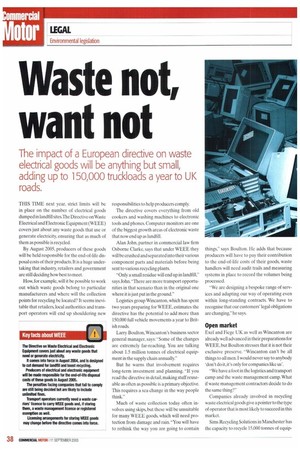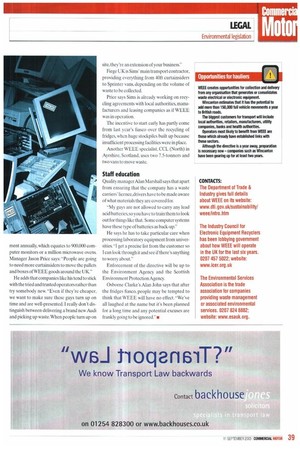Waste not, want not
Page 38

Page 39

If you've noticed an error in this article please click here to report it so we can fix it.
The impact of a European directive on waste electrical goods will be anything but small, adding up to 150,000 truckloads a year to UK roads.
THIS TIME next year, strict limits will be in place on the number of electrical goods dumped in landfill sites.The Directive on Waste Electrical and Electronic Equipment (WEEE) covers just about any waste goods that use or generate electricity, ensuring that as much of them as possible is recycled.
By August 2005. producers of these goods will be held responsible for the end-of-life disposal costs of their products. It is a huge undertaking that industry, retailers and government are still deciding how best to meet.
How, for example, will it be possible to work out which waste goods belong to particular manufacturers and where will the collection points for recycling be located? It seems inevitable that retailers, local authorities and transport operators will end up shouldering new responsibilities to help producers comply.
The directive covers everything from old cookers and washing machines to electronic tools and phones. Computer monitors are one of the biggest growth areas of electronic waste that now end up as landfill.
Alan John, partner in commercial law firm Osborne Clarke, says that under WEEE they will be crushed and separated into their various component parts and materials before being sent to various recycling plants.
"Only a small residue will end up in landfill," says John. "There are more transport opportunities in that scenario than in the original one where it is just put in the ground."
Logistics group Wincanton, which has spent two years preparing for WEEE, estimates the directive has the potential to add more than 150,000 full vehicle movements a year to British roads.
Larry Boulton, Wincanton's business sector general manager, says: "Some of the changes are extremely far-reaching. You are talking about 1.5 million tonnes of electrical equipment in the supply chain annually" But he warns that involvement requires long-term investment and planning. "If you read the directive in detail, making stuff reuseable as often as possible is a primary objective. This requires a sea change in the way people think."
Much of waste collection today often involves using skips, but these will be unsuitable for many WEEE goods, which will need protection from damage and rain. You will have to rethink the way you are going to contain things," says Boulton. He adds that because producers will have to pay their contribution to the end-of-life costs of their goods, waste handlers will need audit trails and measuring systems in place to record the volumes being processed.
"We are designing a bespoke range of services and adapting our way of operating even within long-standing contracts. We have to recognise that our customers' legal obligations are changing," he says.
Open market
Exel and Fiege UK as well as Wincanton are already well advanced in their preparations for WEEE, but Boulton stresses that it is not their exclusive preserve. "Wincanton can't be all things to all men. I would never say to anybody 'don't do it, it's only for companies like us'.
"We have a foot in the logistics and transport camp and the waste management camp. What if waste management contractors decide to do the same thing?"
Companies already involved in recycling waste electrical goods give a pointer to the type of operator that is most likely to succeed in this market.
Sims Recycling Solutions in Manchester has the capacity to recycle 15,000 tonnes of equip ment annually, which equates to 900,000 computer monitors or a million microwave ovens. Manager Jason Price says: "People are going to need more curtainsiders to move the pallets and boxes of WEEE goods around the UK."
He adds that companies like his tend to stick with the tried and trusted operators rather than try somebody new. "Even if they're cheaper, we want to make sure these guys turn up on time and are well-presented. I really don't distinguish between delivering a brand new Audi and picking up waste, When people turn up on site, they're an extension of your business."
Fiege UK is Sims' main transport contractor, providing everything from 40ft curtainsiders to Sprinter vans, depending on the volume of waste to be collected.
Price says Sims is already working on recycling agreements with local authorities, manufacturers and leasing companies as if WEEE was in operation.
The incentive to start early has partly come from last year's fiasco over the recycling of fridges, when huge stockpiles built up because insufficient processing facilities were in place.
Another WEEE specialist, CCL (North) in Ayrshire, Scotland, uses two 7.5-tonners and two vans to move waste.
Staff education
Quality managerAlan Marshall says that apart from ensuring that the company has a waste carriers' licence, drivers have to be made aware of what materials they are covered for.
-My guys are not allowed to carry any lead acid batteries,so you have to train them to look out for things like that. Some computer systems have these type of batteries as back-up."
He says be has to take particular care when processing laboratory equipment from universities. I get a precise list from the customer so I can look through it and see if there's anything to worry about."
Enforcement of the directive will be up to the Environment Agency and the Scottish Environment Protection Agency.
Osborne Clarke's Alan John says that after the fridges fiasco, people may be tempted to think that WEEE will have no effect. "We've all laughed at the name but it's been planned for a long time and any potential excuses are frankly going to be ignored." •








































































































































































































